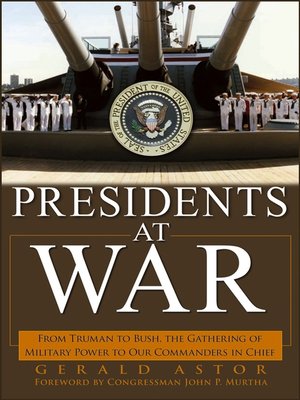Presidents at War
ebook ∣ From Truman to Bush, the Gathering of Military Powers to Our Commanders in Chief
By Gerald Astor

Sign up to save your library
With an OverDrive account, you can save your favorite libraries for at-a-glance information about availability. Find out more about OverDrive accounts.
Find this title in Libby, the library reading app by OverDrive.



Search for a digital library with this title
Title found at these libraries:
| Library Name | Distance |
|---|---|
| Loading... |
The Korean War, the Bay of Pigs, the Cuban Missile Crisis, Vietnam, Cambodia, Lebanon, El Salvador, Grenada, Iran-Contra, Nicaragua, Panama, the Gulf War, Somalia, Kosovo, Afghanistan, Iraq
What do these events and scores of others have in common? Each of these wars, incursions, invasions, and covert actions was undertaken by the United States without the benefit of a declaration of war. Where congressional sanction was sought, it usually took the form of a resolution, frequently issued after the fact.
Presidents at War is the first book to examine all of America's post-World War II military actions through the lens of the president's authority as commander in chief. Author Gerald Astor analyzes the various presidents' rationales for undeclared warfare, from Truman's citing of an international agreement (the United Nations) to Eisenhower's domino theory, to Kennedy's defense of the Monroe Doctrine, to bald assertions of authority by a commander in chief because of fears of communist expansion, threats to oil in the Middle East, humanitarian concerns in the Balkans, or provocations by terrorists. Each commander in chief served as a precedent for those who followed. Astor contends this cumulative process was accelerated by the September 11, 2001, attacks that led to the war on terrorism, the invasion of Iraq to oust the cruel regime of Saddam Hussein for his alleged possession of weapons of mass destruction, and the potential trampling of civil liberties in the United States.
Has the president become free to take military action on the slightest whim? Is it now true that, as Richard Nixon said, "If the president does it, then it is not illegal"? Is the Constitution obsolete? And does Congress have the tools with which to curb this seemingly unbridled power? Read Presidents at War and find out.
The EPUB format of this title may not be compatible for use on all handheld devices.







